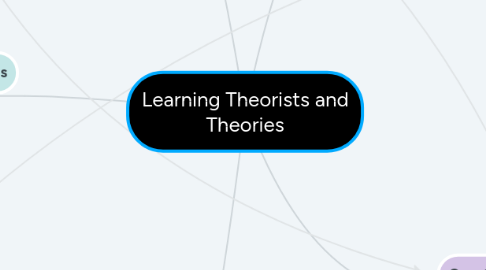
1. Pragmatism
1.1. Rejected behaviorism as too simplistic
1.2. Experiential learning: "knowledge comes from the impressions made on upon us from natural objects"
1.2.1. Problem-based learning
1.2.1.1. Learner-centered approach where learners engage with the material by solving an open-ended problem.
1.2.2. Inquiry-based learning
1.2.2.1. Method of encouraging learners to embrace and activate their curiosity.
1.3. Pioneered by John Dewey
1.4. Defined before constructivist approaches
1.5. Should focus on a balanced approach, not a focus on the learner's abilities.
2. Recent Theorists
2.1. Robert Gagne - Conditions of Learning Theory
2.1.1. Several different types of learning which each require different types of instruction.
2.1.1.1. Verbal information
2.1.1.2. Intellectual Skills
2.1.1.3. Cognitive strategies
2.1.1.4. Motor skills
2.1.1.5. Attitude
2.1.2. Hierarchy of instructional events
2.1.2.1. Reception - gaining learner attention
2.1.2.2. Expectancy - Informing learners of the objective
2.1.2.3. Retrieval - Stimulating recall of prior learning
2.1.2.4. Selective Perception - Presenting the stimulus
2.1.2.5. Semantic Encoding - Providing learning guidance
2.1.2.6. Responding - Eliciting performance
2.1.2.7. Retrieval - Assessing performance
2.1.2.8. Generalization - Enhancing retention and transfer
2.2. Jerome Bruner (Scaffolding Theory)
2.2.1. Learning is an active process that requires learners to construct their own learning experiences.
2.2.2. Facilitators can create experiences that engage in a sequence that prepares the learner to engage with the next content in the sequence.
2.2.3. Uses inquiry and discovery to drive the learning experience.
3. Social Learning Theory
3.1. Based on the work of Albert Bandura
3.2. People learn from each other.
3.2.1. Observation
3.2.2. Imitation
3.2.3. Modeling
3.3. To be effective, learners must be engaged with the content in different levels.
3.3.1. Attention and focus matter.
3.3.1.1. Distinctiveness
3.3.1.2. Effectiveness
3.3.1.3. Valence
3.3.1.4. Prevalence
3.3.2. Retention depends on context.
3.3.2.1. Requires internalization of knowledge
3.3.2.2. How is knowledge related to existing knowledge?
3.3.3. Reproduction occurs on demand.
3.3.3.1. How do you use the knowledge when needed?
3.3.3.2. Requires practice of knowledge
3.3.3.2.1. Mental
3.3.3.2.2. Physical
3.3.4. Motivation can be intrinsic or extrinsic.
3.3.4.1. Intrinsic: behavior that is driven by internal rewards (feeling of a job well done, etc.)
3.3.4.2. Extrinsic: behavior that is driven by external rewards (monetary, recognition, etc.)
4. Behaviorism
4.1. Ivan Pavlov
4.1.1. Classical Conditioning: type of learning where a stimulus is used to evoke a response traditionally evoked by a different stimuli.
4.1.2. Pavlov's dogs
4.1.2.1. Meat powder
4.1.2.2. Bell
4.1.2.2.1. Bell rang on own -- no salivation
4.1.2.2.2. Bell rang with meat -- salivation
4.1.2.2.3. Bell rang with no meat -- salivation
4.1.2.3. Salivation
4.1.3. Led to experiments in humans by John B. Watson
4.2. B.F. Skinner
4.2.1. Operant Conditioning: environmental experiences cause modification of behaviors
4.2.2. Different types of reinforcement stimuli
4.2.2.1. Positive (rewards)
4.2.2.2. Negative (punishment)
4.2.3. Different schedules of reinforcement
4.2.3.1. Fixed interval
4.2.3.2. Variable
4.2.3.3. Constant
5. Constructivism
5.1. Jean Piaget
5.1.1. Theory of Cognitive Development is one of the foundational theories that underlies of Constructivism.
5.1.1.1. Assimilation and Accomodation
5.1.1.2. Sensorimotor stage.
5.1.1.3. Concrete operational stage
5.1.1.4. Formal operational stage
5.1.2. Theory of Constructivism states that instructors have to make curriculum that enhances students logical and conceptual growth. Not solely knowledge transfer.
5.1.2.1. Learners produce knowledge and form meaning through their past experiences.
5.1.2.2. Accomodation: preparing the learner to succeed through scaffoling
5.1.2.3. Assimilation: causes learners to incorporate new experiences into old experiences.
5.1.2.3.1. Develops new outlooks
5.1.2.3.2. Rethink past misunderstandings
5.1.2.3.3. Evaluate importance
5.2. Lev Vygotsky
5.2.1. Social development theory that social interactions create the foundation of development.
5.2.1.1. More Knowledge Other (MKO) - person who has a higher ability level than the learner
5.2.1.2. Zone of Proximal Development (ZPD) - performance gap between desired and actual state.
5.2.1.3. Social development learning happens when MKO close the gap for ZPD.
5.2.2. Consciousness and cognition don't come until after as an end product of the process.
5.2.2.1. Human intelligence cannot reach its highest level without a social element.
5.2.2.2. Functions appear twice during the development process.
5.2.2.2.1. Interpsychological (social)
5.2.2.2.2. Intrapsychological (internal)
